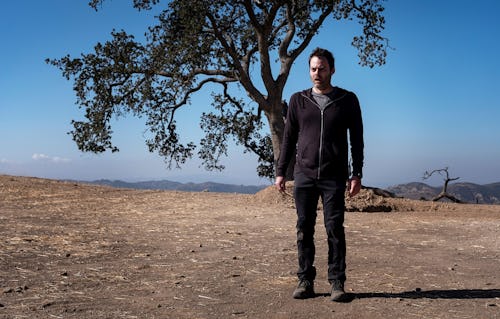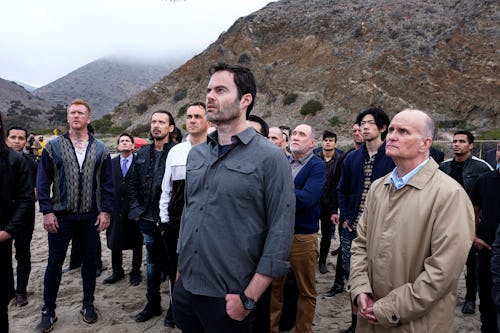
*Spoilers for the Barry Season 3 finale below
One of the most astonishing shots in the latest season of Barry comes at the start of the fourth episode. A woman is just getting back home, on the phone catching up with her husband, who is away. She sits at the dining table, they exchange I love yous, and the husband, immediately after hanging up on the other end, is shot dead in his hotel room by Barry. The camera cuts back to the wife, sitting in the same spot at the dining table years later, her hair grayed, face wizened, eyes empty.
The sequence is jarring in the plain sense that we are viscerally confronted with what grief has done to this woman. But it’s informed first by the fact that her husband’s murder is the same hit that first introduced us to Barry in the pilot episode. The shot of the woman, though, is less about feeling how far we and Barry have gone since the start of the show, and instead about seeing what has happened on the periphery — what Barry has wrought in this time we’ve been with him, the people he’s left in the wake of his destruction.
In other words, Barry’s outstanding, gut-punch of a third season is about reckoning. This focus on the grief of others is reinforced in the final moment of Sunday’s season finale — perhaps the most consistently brutal episode in the entire series — when Barry, set up by his old acting coach Gene Cousineau, is finally arrested. We watch the scene in one take, from within the home of Jim Moss, the father of a detective Barry killed: Barry is taken away, an army of SWAT and police peel out, Cousineau walks off, and suddenly it’s just Jim, standing outside in the cold of the night. Inside, a photo of Janice sits on a table. No Barry and no Cousineau in the end here (each of whom constituted the final shot of the last two seasons, respectively), just a man who, after the mission has been completed, is left to walk back into his empty house and stare at a photo of his dead daughter.
This new kind of sobering confrontation is set up in the latter half of the season, as a constellation of bereaved family members are recruited by Barry’s former hitman manager Fuches to seek vengeance. As they each make their attempt, the show becomes less about Barry trying to get past what he’s done, but instead simply about what he’s done. In the finale, right after Sally ends up killing one of Barry’s vengeance-seekers, he grabs her blood-splattered face and tells her to repeat to herself, “Barry did this.” It’s not just a refrain to desperately extract the life-altering trauma already setting into Sally’s brain, it’s also true — Barry did do this. Because of Barry, now Sally is a murderer.
Notably, the line is one of a few callbacks throughout the finale: “Barry did this” echoes the time when Fuches whispers to Cousineau in the season two finale, “Barry Berkman did this,” referencing Janice Moss’s murder. There’s also Jim Moss forcing Cousineau to admit he doesn’t love Barry, a refutation of when Barry forces Cousineau to say that he does love him in this season’s second episode; then there’s Albert, an FBI agent whose life Barry saved in Afghanistan, telling him that he isn’t “evil,” a reference to when Barry hopelessly asked NoHo Hank if he was an evil person early on in season two; and there is also Albert telling Barry he has to stop killing “starting now,” a repeat of the final line of season one when Barry tells himself the exact same thing. The callbacks here are deliberate: you can only run for so long before everything comes back to haunt you, before you have to face what you’ve done.
When I reviewed this new season in April, I wrote, based off of the first six episodes that were available for review, that the show, while nevertheless still superb (aside from its deft and singular balance of dark comedy, it’s one of the most cinematically enriching shows out there), was somewhat rockier for potentially pushing Barry’s darkness too far, to a place that strips him of his status as a tragic figure. In the final two episodes, though, the grander purpose and tone here clicks: it is in fact exactly about shaking us into seeing that there is nothing redeemable about Barry at all.

This truth is most poignant in the season’s penultimate episode, when, by no coincidence, Barry is incapacitated, poisoned by the wife of one of his victims and unable to utter a single line of dialogue to engender our sympathy. Catatonic, he’s laying in the back of a car, either being rescued or killed by the father of Ryan, another of his victims. See-sawing on what to do, the man tells Barry about how he still has conversations with his dead son.
“I could leave you here, and you’ll rot. But I can’t,” he says. Then, sighing, he wonders aloud, “Why? Why?” It’s a question that can be interpreted in several ways: Why can’t he just let Barry die and give him what he deserves? Why did Barry do what he did? Why in the cruel cosmic fate of the universe has he ended up here, in this car, with his son’s murderer, waiting to kill him only to ultimately end up killing himself? “I want to see my son again,” he trembles.
Only half there, if at all, Barry is busy hallucinating. He is on a beach, eventually surrounded by a crowd of the dozens of people he’s killed. He waves at the husband of the woman who poisoned him, a former Marine buddy (arguably the most intense death of the show) who looks back at him, confused and slightly irked. They’re all there waiting for something, before an eerie, otherworldly noise in the sky greets them. There’s a wistfully surreal and sardonic quality here that makes the scene emblematic of Barry but that also transcends into a real apex moment of the show. Most of all, though, it is a poetic, ominous moment of clarity punctuated by Barry suddenly waking up to reality. He’s being wheeled into the hospital, very much alive, while he looks off into the distance at Ryan’s father, slumped over in the car, a gunshot wound to the head. The juxtaposition of it all is sharp: Barry doesn’t deserve to be saved.
Yet, because of the intrinsic qualities of pathos and endearing charisma that Hader embodies as an actor, we’ve nevertheless wanted him to be; it’s the driving force of the show’s premise. There is an anecdote from a profile of Bill Hader that tracked him while he made the second season that comes to mind, informing this phenomenon and ultimately what exactly season three is doing:
[Hader] acknowledged, however, that he was “shocked by how many people like Barry. Because it’s not ‘He kills people, but he’s really just like you and me.’ Barry is a murderer. His truth is super fucking sad and ugly. But people see me and think, Oh, it’s that funny guy!” After a screening of the show on the Sony lot last year, a male agent said, “I find Sally a little unlikable.” One of the show’s female writers fired back, “Yeah, but Barry fucking kills people.”
By now it should be clear: Barry fucking kills people. And death doesn’t just dissipate. At the start of the season, when both Hank and Cousineau told Barry to earn forgiveness, it seemed to be a mandate for where the show was heading, focusing on his struggle to fight for forgiveness. By the end, it turned out to have been a trick. Barry has no right to forgiveness. Not when, even after Albert has offered absolution, he still goes back to the house to kill. Not when he’s left an entire beach full of bodies. Not when he’s corrupted innocent people and dragged them into his dark orbit.
After Sally kills the would-be assassin, Barry tells her, “I know where I’m going after all this. I don’t want you to go to the same place.” At this point, there’s little doubt his premonition is right.







